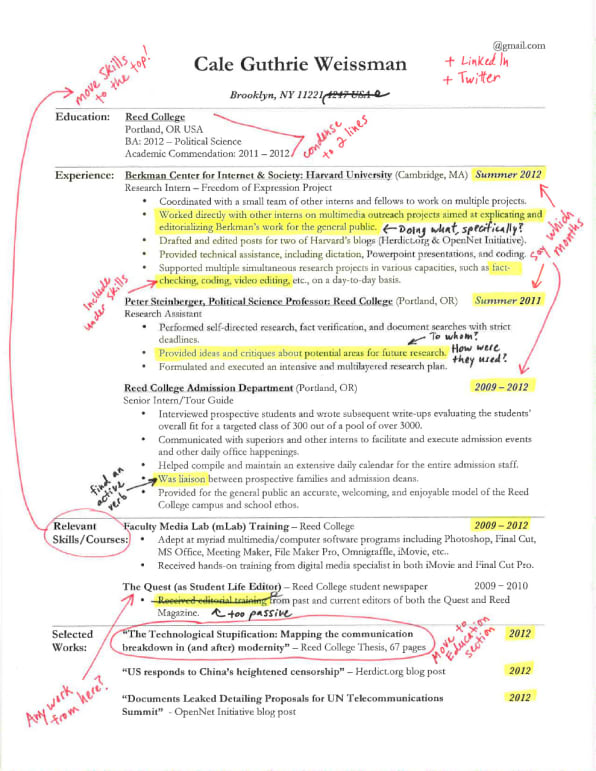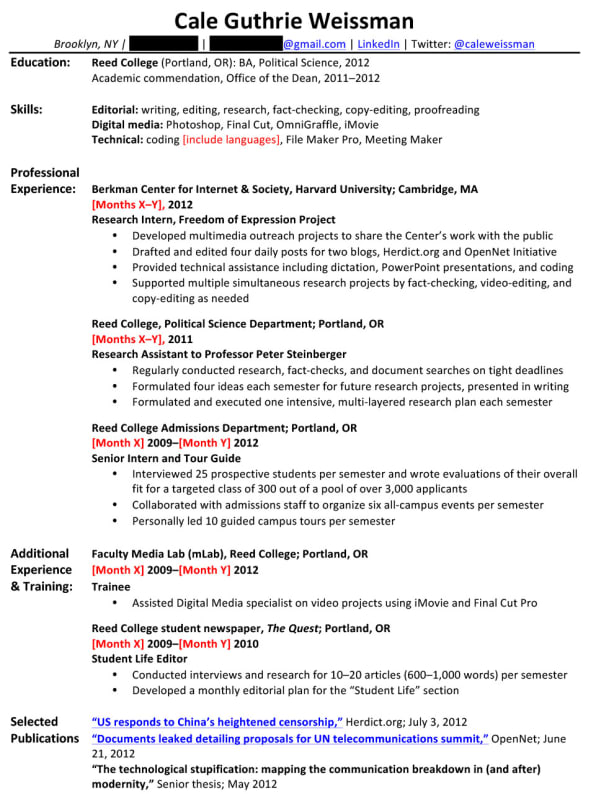Career Experts Mercilessly Revised My Entry-Level Resume
A couple of weeks ago I asked some experts to revisit a cover letter I wrote early in my career. Their reviews? “Verbose and methodical”; “does not capture my attention”; “vague.”
Well, fair enough. The revised version they offered up would’ve delighted 24-year-old me, with whom (and I realize I’m biased here) it’s easy to sympathize: When you’re only a few months or years into your career, you’re inexperienced as both an employee and as a job seeker. With so little by which to sell yourself and scant sense of how to do it strategically, it’s inevitable that you’ll write clumsy, boring, and (yes) “vague” cover letters and resumes at first.
So in the spirit of helping younger job candidates avoid those pitfalls, I asked my colleague Cale Weissman, a staff writer here on Fast Company’s Leadership section, if he’d be willing to let his entry-level resume undergo a similar makeover. He very kindly obliged.
Here it is, marked up with a few key notes provided by each of the three career experts I asked to edit it:

Skills First, Experience Second
Weissman describes his entry-level resume as “my attempt to show myself as a ‘media professional.’” To that end, he focused on internships and writing gigs that he’d picked up throughout his college career, and not other experience like retail work.
That’s great, says Sheila Benko, senior associate director of academic engagement at UCLA, but since “employers typically only take about 30 seconds to review a resume . . . it’s critical to make your relevant experience pop.” Career coach Rebecca Vertucci agrees that Weissman’s “main strengths and skill sets were not being highlighted in a way that stood out. Recruiters and hiring managers need to know right away what key skills and abilities you have.”
That’s why both suggest adding a “skills” section at the top, cataloguing anything that’s relevant to the media roles Weissman might have been applying for. Vertucci advises highlighting “any and all technical skills, since most entry-level roles are technical in nature today.” That can be either more or less the case depending on the role, but it’s probably a good rule of thumb.
As Fast Company contributor Ximena Vengoechea pointed out last year, it’s your hard skills that are more likely to land you the job early on, whereas your soft skills may prove more decisive later in your career.
“This does not mean you have to be a coder,” Vertucci adds. But one “reason they are investing in a new, recent grad is to create efficiencies and help move the company forward in areas where they may be weak. Anything you know how to do–social media, video editing, presentations, graphics, etc.–if you can do it, list it.”
Getting Into Specifics
One thing Weissman’s resume seems to share with my cover letter is a lack of specificity. “I always want to see stronger, more expressive verbs,” says Nicole Thomsen, director of corporate recruiting at 2U, which works with universities to create online degree programs. Passive expressions like “was liaison” may not pack enough punch.
Benko points out that Weissman does a better job using action verbs to describe his research experience (“performed self-directed research”; “formulated and executed [a] . . . research plan”), but when he moves on to his editorial role at The Quest, it says merely that he “received editorial training.” Plus, she observes, “a career in media can encapsulate both writing and public speaking–you’ve been a tour guide but said nothing about giving tours. These are passive–how did you demonstrate what you learned” in roles like these, even if if that isn’t related to research and writing?
There are two ways to correct passive language and vagueness, the experts agree. The first is to quantify things: In describing his job in the admissions office, Benko suggests saying how many events Weissman organized, how many guests attended, how many students he interviewed, and how many tours he gave. Thomsen also points out that the dates of each role aren’t defined. “Always include specific dates of employment,” she suggests, ”the months, not just the years.”
The second approach is to use the job description for distilling relevant strengths based on a jumble of experiences. “Don’t make employers guess what you can do,” Benko advises (“Never use ‘etc.’ in a resume!” she adds). “In this case, it looks like you have experience in research, communication, [and] leadership,” so Weissman could separate each of those out, aligning them with the key demands of the job description. For instance, writing a senior thesis “is a strong indication you have been trained in research and writing,” says Benko, so Weissman could just as easily include this under ‘research experience’ as under ‘education.’
Odds And Ends That Count
Finally, there are some formatting peculiarities worth polishing up. Weissman’s education section doesn’t need to take up four whole lines, and he could probably cut his physical address. “You don’t want to waste the first quarter of your page on just contact information and education,” Vertucci says. “Also include a link to your LinkedIn profile as part of your contact section,” plus any other social media accounts relevant to the role; Twitter would be an obvious choice.
Related: The Ultimate Checklist For Digitally Upgrading Your Resume
Thomsen says she sees “too much underlining and italicizing; some bolding for emphasis is okay, but anything else is too busy.” Still, she says Weissman did a good job of hanging onto white space for readability and avoided shrinking the margins.
So what would Weissman’s entry-level resume look like after incorporating this feedback from all three experts? Probably something like this:

Sure looks like a “media professional” in the making, don’t you think?
Fast Company , Read Full Story
(92)














